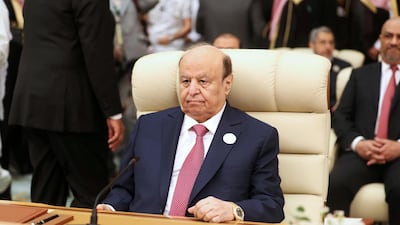The formation of Yemen's new government will provide the impetus for a peace process that could end the political deadlock and revive talks, officials told The National.
A new cabinet was announced early this December in a bid to end a power struggle between nominal allies, the government and the Southern Transitional Council, which declared self-rule in Aden.
The main Yemeni forces in a Saudi-led coalition fighting the Iran-backed Houthi rebels, they have been in disagreement in the south for about two years.
The disagreements complicated efforts to enforce a nationwide ceasefire and pave the way for the resumption of negotiations to end the war that has raged for six years.
“The formation of the new government is a positive and pivotal step, not only to unite forces and efforts against the Houthis but also to stabilise the situation in liberated areas and restore basic services to the people of Yemen,” said Marwan Noman, Yemen’s deputy permanent representative to the UN.
Government officials have been wary of the Houthis' commitment to faithfully engage in peace talks.
“Nevertheless, when it comes to peace talks ... we need to be very cautious. There are some preconditions to be honoured,” Mr Noman said.
Measures to build confidence were agreed on during talks in Sweden in December 2018.
They included demilitarising the Yemeni port of Hodeidah to prevent a battle in the Red Sea port city and stave off famine.
The release of hundreds of prisoners and a ceasefire to de-escalate tension were also agreed.
“I think it will be difficult to go to any talks before the parties agree to the joint declaration proposed by the UN special envoy, Martin Griffiths,” Mr Noman said.
The challenges facing this government are “tremendous”, he said.
Mr Noman said he was optimistic and hoped that 2021 was the year of peace in Yemen.
Another government official said the Houthi rebels were the only ones “standing in the way of peace”.
“We want to unite to create peace and every day this urge is intensified when we see the suffering of the Yemeni people,” he said.
“We are ready to build trust with the Houthis. The government is complete and we are ready."
Yemeni officials consider the formation of the government a “crucial step towards ending the war”.
The UN envoy to Yemen, Martin Griffiths, has told the Security Council that he plans to convene face-to-face consultations between the government and Houthis in the coming year.
The UK has offered to host the talks, the official said, but the news was yet to be confirmed.
“Now that the new government is announced, we should expect something before the spring,” he said.
UN-led efforts to stop the war
Mr Griffiths and his team maintain that the formation of the new government is “a pivotal step towards a lasting political resolution to the conflict in Yemen”.
He said his office had been mediating a deal between the sides that would ensure the parties stopped fighting, and adopted measures to reopen the country, ease the suffering and resume the political process.
“It is time for the parties to come together, discuss their differences and agree on a realistic way forward," Mr Griffiths said.
"In 2021, I would like to see the parties demonstrate seriousness about resuming an inclusive political process to end the conflict.”


